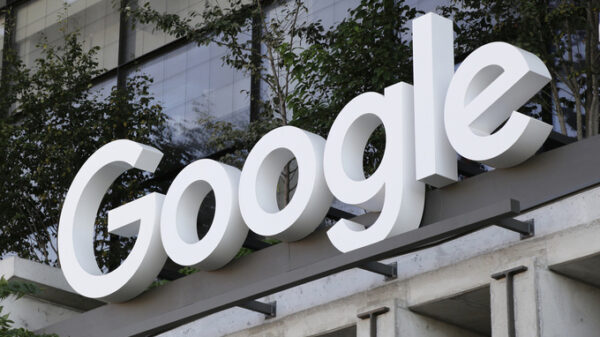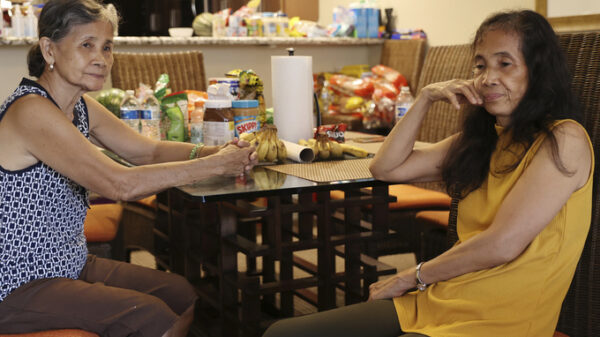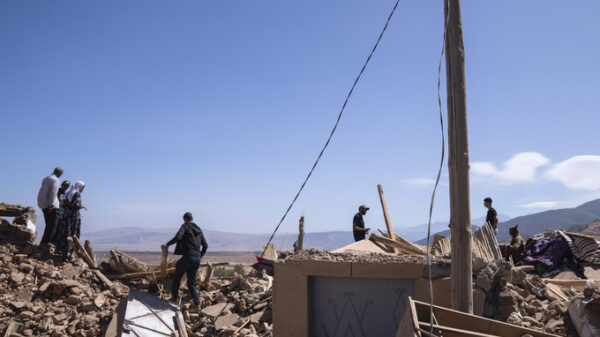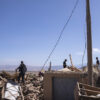Evacuated residents from Irpin gather in an assistance center in the outskirts of Kyiv, Ukraine, Wednesday, March 30, 2022. Ukrainian officials say Russian forces pounded areas around Kyiv and another Ukrainian city overnight. The attacks come hours after Moscow pledged to scale back military operations in those places. (AP Photo/Rodrigo Abd)
BERLIN — The German government says it has received assurances from Russia that European companies won’t have to pay for Russian gas supplies in rubles.
Olaf Scholz’s office said the German chancellor spoke by phone Wednesday afternoon with Russian President Vladimir Putin, who had requested the call, about the issue.
During the call Putin said he planned to issue a law requiring gas supplies to be paid in rubles from April 1, Scholz’s office said.
“At the same time (Putin— emphasized during the conversation that there would be no change for European contractual partners,” who would continue to pay only in euros to Gazprom Bank, it said.
The bank, which is not currently subject to sanctions, would convert the payments to rubles,” Scholz’s office added.
It noted that the German chancellor did not agree to the procedure but instead requested written information to understand it better.
OTHER DEVELOPMENTS:
LONDON — Britain’s government has announced new legal powers prohibiting U.K. maintenance on planes and ships belonging to Russian oligarchs. The Foreign Office said Wednesday the new sanctions have been used immediately against billionaire oil tycoon Eugene Shvidler and Oleg Tinkov, founder of Tinkoff bank.
Shvidler, who’s already sanctioned over his business links to Roman Abramovich, has had two private jets seized.
Transport Secretary Grant Shapps said the new law adds to Britain’s powers to “deprive oligarchs’ access to their luxury toys.”
British authorities on Tuesday seized a Russian-owned superyacht valued at $38 million. They did not identify the owner of the vessel, only saying the billionaire was connected to President Vladimir Putin.
The government also said that finance, trade and shipping sanctions imposed on Crimea have been expanded to the Donetsk and Luhansk regions.
WASHINGTON — The Pentagon said Wednesday that over the last 24 hours it has seen some Russian troops in the areas around Kyiv moving north toward or into Belarus.
Pentagon press secretary John Kirby said the U.S. does not view this as a withdrawal, but as an attempt by Russia to resupply, refit and then reposition the troops.
“We don’t know exactly where these troops are going to go,” he said.
But he noted that Russia has talked about prioritizing the Donbas region. Kirby was speaking on CNN and Fox Business.
Kirby also said that Defense Secretary Lloyd Austin and Army Gen. Mark Milley, chairman of the Joint Chiefs of Staff, have continued to try to speak with their Russian counterparts but they have “not answered and they have not replied with a willingness to do so.”
___
UNITED NATIONS — The United Nations chief says one-quarter of humanity — two billion people — are living in conflict areas today, and the world is facing the highest number of violent conflicts since the end of World War II in 1945.
Secretary-General Antonio Guterres cited conflicts from Yemen, Syria, Myanmar and Sudan to Haiti, Africa’s Sahel “and now the war in Ukraine — a catastrophe shaking the foundations of the international order, spilling across borders and causing skyrocketing food, fuel and fertilizer prices that spell disaster for developing countries.”
He told the U.N. Peacebuilding Commission on Wednesday that last year 84 million people were forced to leave their homes because of conflict, violence and human rights violations. “And this year, we estimate that at least 274 million will need humanitarian assistance,” he said.
Guterres said this is taking place “at a moment of multiplying risks that are pushing peace further out of reach — inequalities, COVD-19, climate change and cyber threats, to name just a few.”
He said “the flames of conflict are fuelled by inequality, deprivation and underfunded systems” and these issues must be addressed urgently.
___
LONDON — British Prime Minister Boris Johnson says Western nations shouldn’t lift sanctions on Russia until all Moscow’s troops have left Ukraine.
Johnson said a cease fire would not be enough, and the G-7 should “intensify sanctions with a rolling program until every single one of (President Vladimir Putin’s) troops is out of Ukraine.”
Speaking to a committee of British lawmakers on Wednesday, Johnson also said Britain was discussing “going up a gear” in support to help Ukraine defend itself. He said sending armored personnel carriers was something the U.K. was “looking at.”
The U.K. has sent anti-tank weapons and other military equipment to Ukraine but wants to avoid anything that could be seen as escalating the conflict.
___
BRATISLAVA, Slovakia — Slovakia’s Foreign Ministry says it has decided to reduce the Russian diplomatic mission in the country by 35 people.
The ministry said on Wednesday the Russian side was informed about the move in a diplomatic note.
“The given step is an inevitable reaction to the continuing activities of the Russian embassy’s personnel that violate the Vienna Convention on diplomatic relations, Slovakia’s interests and an effort to develop partnership relations with the Russian Federation,” the ministry said.
Slovakia already expelled three Russian diplomats two weeks ago over a spying scandal.
At least four European allies expelled dozens of Russian diplomats on Tuesday, an apparent coordinated effort to tackle espionage.
___
WASHINGTON — U.S. intelligence officials have determined that Russian President Vladimir Putin is being misinformed by his advisers about Russian forces’ performance in Ukraine, according to a U.S. official.
The official, who spoke on the condition of anonymity Wednesday to discuss the recently declassified intelligence finding, said that Putin has felt misled by the Russian military and there is now persistent tension between him and senior Russian defense officials.
The official did not detail underlying evidence for how U.S. intelligence made the determination.
But the intel community has concluded that Putin was unaware that the military had been using and losing conscripts in Ukraine. They also have determined Putin is not fully aware of the extent to which the Russian economy is being damaged by economic sanctions imposed by the U.S. and allies.
The findings demonstrate a “clear breakdown in the flow of accurate information” to Putin, and show that Putin’s senior advisers are “afraid to tell him the truth,” the official said.
— Associated Press writers Aamer Madhani and Nomaan Merchant contributed from Washington.
___
GENEVA — The U.N. human rights chief says her office is looking into allegations that some residents of the besieged Ukrainian city of Mariupol have been forcibly evacuated to areas controlled by Russian forces or to Russia itself.
Speaking to the U.N.’s Human Rights Council on Wednesday, Michelle Bachelet decried life of “sheer terror” for people in the southeastern port city since Russia’s invasion on Feb. 24.
Ukraine has charged that Russian forces were forcibly taking people from Mariupol and other areas to Russia. Moscow has denied the claims, saying about 500,000 Ukrainians left for Russia voluntarily.
Bachelet said her office also is reviewing “credible allegations” that Russian forces have used cluster munitions 24 times and allegations that Ukrainian forces also have done so.
She says the office also received allegations that two civilians affiliated with Russian armed forces, or backing pro-Russian views, had been killed. She criticized “widespread” detention of civilians who openly support Ukraine in areas under Russian control.
___
MOSCOW — The head of Russia’s delegation in talks with Ukraine this week says that Kyiv’s readiness to consider a neutral status would meet a key Russian demand.
Vladimir Medinsky said that, during Tuesday’s talks in Istanbul, Ukraine submitted a set of proposals including its readiness to adopt a non-bloc, nuclear-free status and drop its bid to join NATO.
He said Ukraine also signaled its readiness not to host foreign military bases and to hold joint drills with foreign militaries only in consultation with countries serving as guarantors of a peace deal, which would include Russia.
Medinsky said in televised comments that the proposals signaled Ukraine’s readiness to reach agreement “for the first time in years,” adding that “if it fulfills the obligations, the threat of creating a NATO bridgehead on the Ukrainian territory will be removed.”
___
KYIV, Ukraine — An adviser to Ukraine’s president says that a vote sealing a prospective agreement with Russia could only be held after Russian troops pull back.
Mykhailo Podolyak said Wednesday that the Russian forces must withdraw to their positions before the Feb. 24 invasion to pave the way for any peace deal to be put on a nationwide referendum.
In an online briefing, he voiced hope for a meeting soon between Ukrainian President Volodymyr Zelenskyy and Russian President Vladimir Putin but wouldn’t say when exactly it could happen.
Podolyak took part in Tuesday’s talks with Russian negotiators in Istanbul. He said a deal on multilateral security guarantees for Ukraine will be a key part of the package to be discussed.
___
BUDAPEST, Hungary — Hungary’s foreign minister has accused Ukraine’s leadership of attempting to interfere in the upcoming Hungarian election. His Ukrainian counterpart has denied the charge in an episode that put further strain on relations.
In a video on social media, Hungarian Foreign Minister Peter Szijjarto claimed that there was “ongoing coordination between the Hungarian left and representatives of the Ukrainian government,” and that Ukraine was attempting to influence Hungary’s April 3 election in favor of a coalition of opposition parties.
Szijjarto did not provide any evidence supporting the claim.
The statements came after Ukrainian President Volodymyr Zelenskyy made several recent comments that were harshly critical of the Hungarian government’s approach to the war.
On Wednesday, Szijjarto claimed that Ukraine’s foreign minister, Dmytro Kuleba, had contacted Ukraine’s ambassador in Budapest to discuss how Ukraine could influence Hungary’s election, in which Prime Minister Viktor Orban is seeking a fourth consecutive term.
But Kuleba told Ukrainian newspaper Evropeiska Pravda that “we have never interfered in Hungary’s internal affairs and especially not ahead of an election.”
___
ISTANBUL, Turkey — A senior Ukrainian official says the country’s delegation to talks with Russia has remained in Turkey to discuss military issues.
David Arakhamia, a member of the Ukrainian delegation who also leads the governing party’s group in parliament, posted on social media that meetings with “high-ranking Turkish officials during which cooperation in the military-technical field will be discussed” were planned for Wednesday.
Turkey is a supplier of drones which Ukrainian forces have used to destroy Russian vehicles from the air.
Russian media reported that the Russian delegation returned home Tuesday after the talks with Ukraine.
___
COPENHAGEN, Denmark — Ukrainian President Volodymyr Zelenskyy has told the Norwegian Parliament that Russia wants “to destroy the foundation of Europe.”
Zelenskyy, speaking through an interpreter during a live video appearance before the 169-member Stortinget, said Wednesday that “the future of Europe is being decided now.”
Speaking generally of Russia’s military activities in Ukraine, Zelenskyy said that “for the Russians, there are no prohibited targets.”
Zelenskyy’s speech was the latest of a string of addresses to lawmakers in several countries, including the United States, Britain, Sweden, Germany, Canada, Israel, Japan and the European Union.
___
KYIV, Ukraine — The Ukrainian military says that Russian troops have intensified their activities in the country’s east.
The Ukrainian general staff said Wednesday that the Russians have scaled up their activities around Izyum, south of Kharkiv, after redeploying some units from other areas. It also said that the Russian forces have intensified shelling and attacks in the eastern Donetsk region, focusing on trying to win control of Mariupol, Popasna and Rubizhne.
The Russian military has said it has shifted its focus to Ukraine’s eastern industrial heartland, the Donbas, where Moscow-backed separatists have fought Ukrainian forces since 2014.
___
COPENHAGEN, Denmark — The Danish government has decided to increase the size and scope of a one-time, tax-free subsidy to housesholds affected by high heating bills. Around 419,000 households will now receive 6,000 kroner ($891) under the plan.
A previous deal reached Feb. 11, before Russia’s invasion started, provided for aid of 3,750 kroner to around 320,000 households to help cover the costs of soaring heating bills.
Energy Minister Dan Jørgensen said the war “has created uncertainty in the energy markets, and gas prices are expected to be at a high level for the rest of 2022.”
The government will now spend 2 billion kroner ($297 million) on the program. Conditions for receiving support include a home being located in an area with district heating fueled primarily by gas power plants, or the home having individual gas heating.
___
LONDON — Britain’s main opposition party has called the government’s progress in welcoming refugees from Ukraine “shamefully slow” after figures showed that just 2,700 visas have been granted under its “Homes for Ukraine” program despite tens of thousands of Britons volunteering to offer refuge.
Some 28,300 applications have been made to bring Ukrainians to safety in the U.K. since the government launched a program on March 18 allowing individuals, charities and businesses to host refugees in homes across the country.
But Britain retains a visa requirement on security grounds, unlike other European countries that had no such requirement or have waived checks in reaction to the humanitarian crisis.
Yvette Cooper of the opposition Labour Party said Wednesday that despite strong support from the British people the government’s “shambolic bureaucracy” was letting everyone down.
___
MOSCOW — The Kremlin says that it will take some time to switch payments for Russian gas to rubles.
Russian President Vladimir Putin has ordered the government to make the necessary arrangements by Friday to ensure that European customers pay for Russian gas in rubles rather than Western currencies. The West has rejected the demand.
Kremlin spokesman Dmitry Peskov said on Wednesday that the switch is going to be a “drawn-out process.” He didn’t give a specific timeframe.
Peskov noted that there is always a gap between supplies and payments in the gas trade. He said the government will soon release the details of the new proposed payment scheme.
___
COPENHAGEN, Denmark — Norway says it has donated a further 2,000 anti-tank weapons to Ukraine to help the country defend itself against the Russian invasion, adding to protective equipment and about 2,000 anti-tank weapons that were sent previously.
Norwegian Defense Minister Odd Roger Enoksen said that if Ukraine succeeds in repelling Russia’s attack, “it will both ensure Ukrainian sovereignty and help maintain the norm of peaceful conflict resolution and respect for borders in Europe.”
___
KYIV, Ukraine — A senior Ukrainian official says that the Russian military has continued shelling areas around the Ukrainian capital.
Oleksandr Pavliuk, the head of the Kyiv region military administration, said Wednesday that there were 30 Russian shellings of the residential areas and civilian infrastructure in the Bucha, Brovary and Vyshhorod regions around the capital over the previous 24 hours.
The barrage came despite a Russian pledge to reduce military activities around Kyiv and the northern city of Chernihiv after Tuesday’s talks between Russian and Ukrainian negotiators in Istanbul.
Olexander Lomako, the secretary of Chernihiv city council, said in a voice message to The Associated Press that military action increased in intensity overnight and “the city was bombed, shelled by artillery and heavy weapons,” with a library and a shopping mall among places that were hit.
___
ROME — Italy is renewing its offer to be a guarantor should any peace deal be reached between Russia and Ukraine that involves a neutrality clause.
Foreign Minister Luigi Di Maio said on Wednesday that Italy “will put at disposal all our efforts, competence and experience” so that it can made a “fundamental contribution” to an agreement.
He told reporters in Berlin, where he was attending a meeting on energy, that Italy was willing to be a guarantor for any neutrality mechanism that might be part of a strategy to end the war.
Earlier this week Ukrainian President Volodymyr Zelenskyy tweeted that he had expressed his appreciation to Italian Premier Mario Draghi for Rome’s “willingness to join the creation of a system of security guarantees” for Ukraine.
___
MOSCOW — The Kremlin says there was no breakthrough in the latest round of talks with Ukraine.
Kremlin spokesman Dmitry Peskov said Wednesday it was a “positive factor” that Ukraine submitted its written proposals, but added that “we can’t say there has been something promising or any breakthroughs.”
He emphasized in a call with reporters that there is still a lot of work ahead following Tuesday’s talks in Istanbul.
On Tuesday, Ukraine set out a detailed framework for a peace deal under which the country would remain neutral but its security would be guaranteed by a group of third countries, including the U.S., Britain, France, Turkey, China and Poland. It said it would also be willing to hold talks over a 15-year period on the future of the Crimean Peninsula, which was annexed by Russia in 2014.
Peskov said Russia’s chief delegate in the talks, Vladimir Medinsky, has reported their results to President Vladimir Putin.
The Kremlin spokesman didn’t discuss details of the negotiations. Asked about the Ukrainian offer of talks over the status of Crimea, he said there is nothing to discuss because Crimea is part of Russia under the country’s constitution.
___
GENEVA — The U.N.’s top human rights body has chosen a Norwegian former judge at the European Court of Human Rights to head a three-member panel to investigate possible abuses and violations in Ukraine following Russia’s invasion.
Erik Møse, formerly president of the International Criminal Tribunal for Rwanda, will be joined by Jasminka Dzumhur, the human rights ombudsperson in Bosnia, and Pablo de Greiff of Colombia, a political theorist who has specialized in justice issues, on the Commission of Inquiry on Ukraine.
The U.N.-backed Human Rights Council created the commission earlier this month.
The three panel members will lead a team that has a one-year mandate to “to establish the facts, circumstances and root causes” of any human rights violations and abuses in Ukraine that could eventually contribute to international justice over the war.
Copyright 2021 Associated Press. All rights reserved.






























You must be logged in to post a comment Login